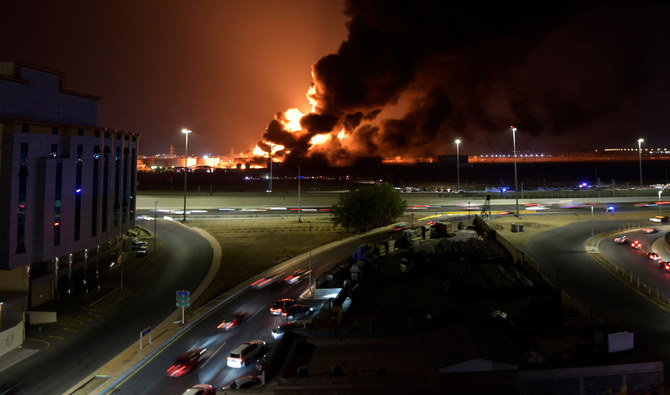RIYADH: Yemen’s Houthi militia were roundly condemned for an attack on a Saudi oil facility in Jeddah on Friday with the US implicating Iran for enabling the attack by supplying weapons to the group against international law.
“Unprovoked Houthi attacks against Saudi Aramco’s oil storage facilities in Jeddah as well as attacks against civil facilities in Jizan, Najran, and Dhahran are acts of terrorism aimed to prolong the suffering of the Yemeni people,” said Jake Sullivan, the US national security advisor.
He accused Iran of facilitating the group’s actions by supplying weapons, which are against UN rules.
“Today’s attacks, just like the attacks against water treatment plants and energy infrastructure on March 19 and 20, were clearly enabled by Iran in violation of UN Security Council resolutions prohibiting the import of weapons into Yemen,” he said in a statement on Friday.
Secretary of State Antony Blinken said the US will work with the Kingdom to strengthen defenses “while also seeking to advance a durable end to the conflict, improve lives, and create the space for Yemenis to determine their own future collectively.”
“At a time when the parties should be focused on de-escalation and bringing needed life-saving relief to the Yemeni people ahead of the holy month of Ramadan, the Houthis continue their destructive behavior and reckless terrorist attacks striking civilian infrastructure.”
UN chief Antonio Guterres on Saturday called for “restraint” on all sides and to “urgently reach a negotiated settlement to end the conflict.”.
“The Secretary-General strongly condemns the recent escalation of the conflict in Yemen,” UN spokesman Stephane Dujarric said in a statement Saturday.
The Coalition to Restore Legitimacy in Yemen said the fire in two tanks at the North Jeddah oil facility had been brought under control, and there were no casualties.
The Kingdom’s s civil defense said it has extinguished fires at two fuel storage tanks in Jeddah that were hit in the attack, state television reported on Saturday.
On Saturday morning, the coalition knocked down two drones over Yemeni territory that were on their way to the Kingdom. It said the launch location was an oil installation in Hodeidah, a city on the Red Sea coast. It also said that it carried out a strike in Sanaa.
Plumes of black smoke could be seen across Jeddah on Friday after the Houthi attack, a reminder of the Iran-backed group’s intent to destabilize international energy security. The militia, which seized the capital Sanaa in 2014 and continues to hold large parts of Yemen, has conducted regular attacks against civilian infrastructure in the Kingdom.
The Saudi-led coalition, which has been supporting the internationally recognized Yemeni government against the Houthis, has intercepted numerous drones and missiles in the past.
An attack in Jeddah on March 19 caused a fire at an Aramco distribution center. A day later, the coalition destroyed an explosive-laden boat near Hodeidah, thwarting an imminent attack on shipping in the vital international maritime route.
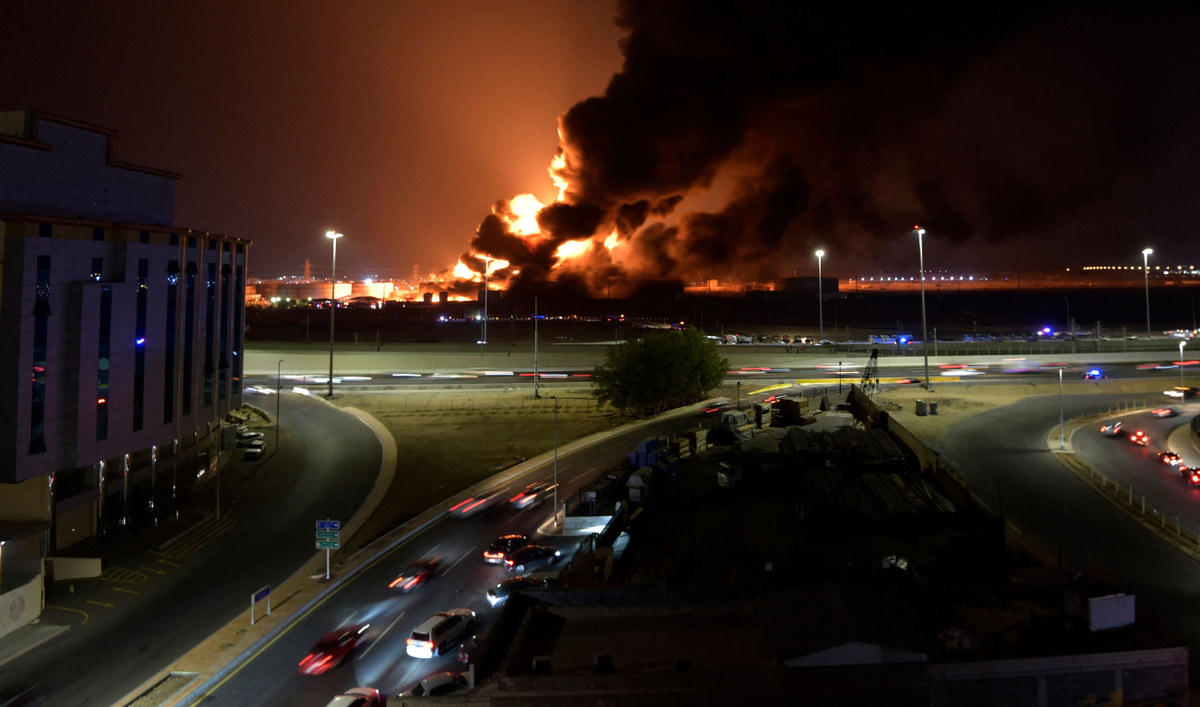
The attack on the Saudi Aramco oil facility has been widely condemned. (AFP)
Previous attacks have also targeted airports in the Kingdom, causing harm to civilians.
In February, 12 civilians were injured by a drone attack targeting Abha airport. In October, ten people where injured at King Abdulaziz Airport in the southern city of Jazan, with another 16 injured by falling shrapnel following an attack at the same airport last month.
The Houthi militia has increased attacks against Saudi energy installations in recent weeks as Iran seeks to revive a nuclear deal that would allow it to begin selling oil again amid increased international energy demand following Russia’s invasion of Ukraine.
The Saudi energy ministry reiterated that it cannot bear responsibility for any shortage of oil supplies to global markets, in light of continuing attacks against its facilities. The ministry said the international community needs to realize the role of Iran in supporting the Houthis to target oil and gas production sites.
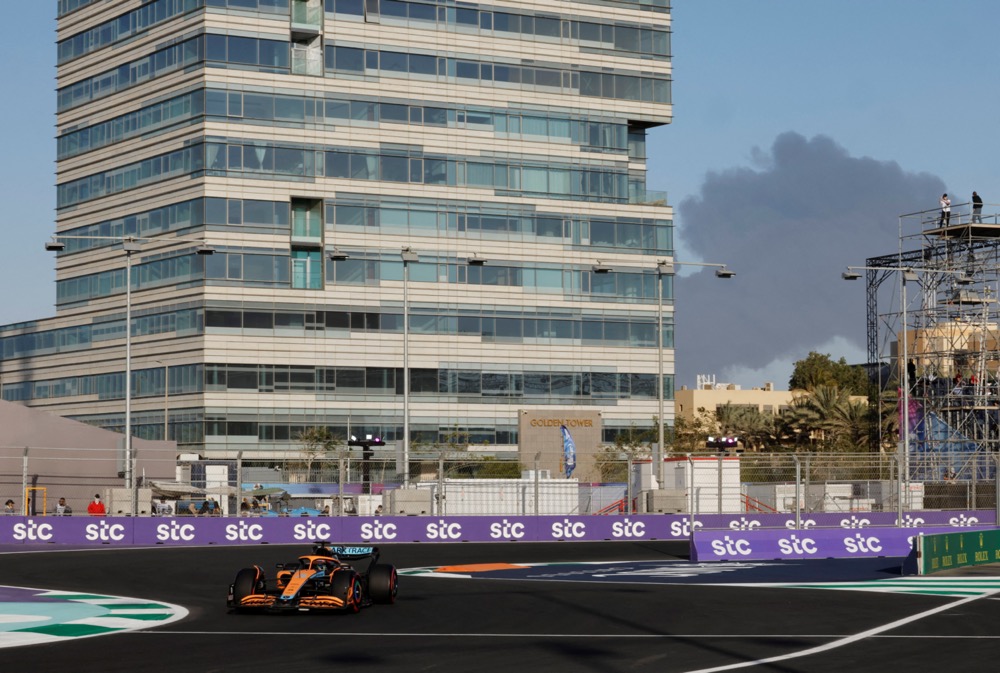
The smoke from the attack could be seen from the track. “I smell burning - is it my car?” said F1 world champion Max Verstappen on his team radio. (Reuters)
In a letter to the UN Security Council on Friday, Saudi Arabia said it reserves the right to defend itself against Houthi aggression.
Princess Reema bint Bandar, Saudi ambassador to the US, tweeted: “The Iran backed terrorist Houthis continue to attack our civilians, infrastructure & energy facilities with Iranian made missiles & UAV’s with impunity. The international community must act against this aggression that targets innocent civilians and global energy supplies.”
Egyptian President Abdel Fattah El-Sisi condemned the attack on the Aramco facility during a call with Saudi Crown Prince Mohammed bin Salman. El-Sisi said Egypt stands in solidarity with the Kingdom to confront hostilities.
British Prime Minister Boris Johnson, who visited the Kingdom last week, tweeted: “I fully condemn the latest Houthi attack against critical sites in Saudi Arabia, including in Jeddah. These strikes put civilian lives at risk and must stop.” His foreign secretary, Liz Truss, called the “abhorrent” attack a continuation of recent terror acts by the Houthis and urged an “immediate halt to the violence.”
The European Union said attacks against cities and civilian infrastructure are unacceptable and must stop, and the latest hostilities increase the risk of further escalation of the Yemen conflict and undermines ongoing efforts to end the war.
“The EU reiterates its call on all sides to participate in the Yemeni-Yemeni talks, starting on Tuesday, 29 March, in Riyadh under the auspices of the Gulf Cooperation Council. The EU recalls its full support to the efforts of UN Special Envoy Hans Grundberg,” said Peter Stabo, spokesman for EU Foreign Affairs and Security Policy.
The UAE, which has also faced attacks by the Houthi militia in the past, condemn Friday’s attack and called on the international community to stand against the repeated acts of aggression, calling for the coalition’s work against the group to be supported.
France, who condemned the group’s attack in the “strongest terms,” said the acts, which threaten the security of Saudi Arabia and the stability of the region, must stop, urging the Houthis to constructively engage with the Yemeni peace initiative under the UN.
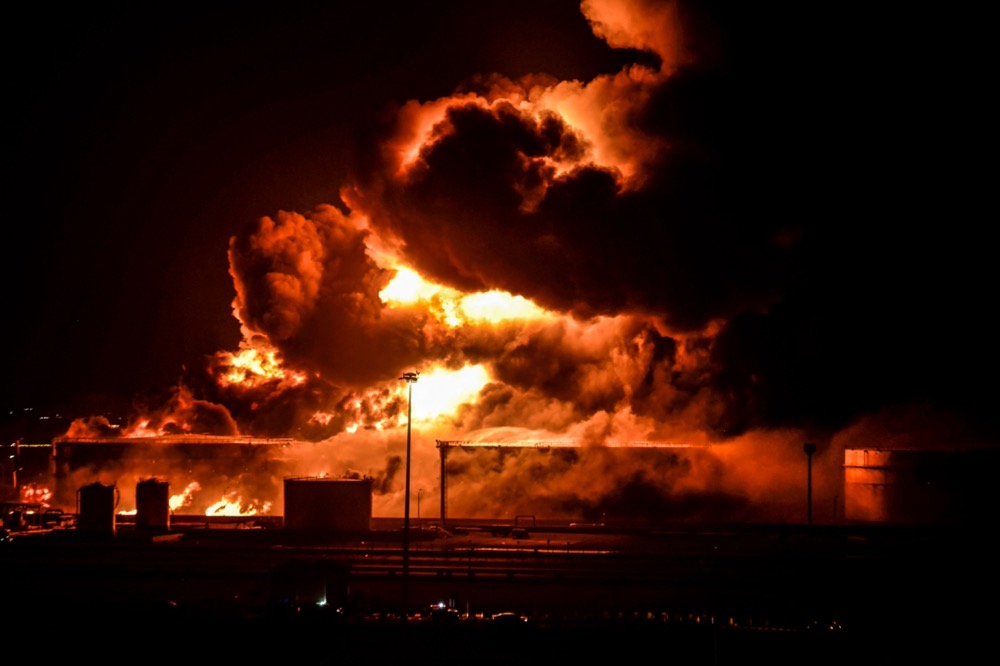
The Saudi energy ministry reiterated that it cannot bear responsibility for any shortage of oil supplies to global markets. (AFP)
Bahrain said it backed all measures Saudi Arabia “deems necessary to maintain its security and stability against these deliberate and systematic attacks that are inconsistent with international humanitarian law.”
Meanwhile, Kuwait condemned the attack, which it referred to as a 'cowardly terrorist attack' that not only affects Saudi Arabia's security and regional stability, but the global energy supply.
Morocco’s King Mohammed VI sent a message of solidarity to King Salman, strongly condemning the attacks and reiterated his country’s full solidarity with the Kingdom.
Canada also condemned the attacks and called on the Houthis to negotiate, reject violence and cease all attacks.
Israeli Prime Minister Naftali Bennett expressed his country's "sorrow" to Saudi Arabia following a wave of Yemen rebel attacks, in a rare public message to the country, with which it lacks formal ties.
"The State of Israel expresses its sorrow to the Kingdom of Saudi Arabia after the horrific attack by the Iranian-backed Huthis," Bennett wrote on Twitter.
Sudan said the Houthi attack represented a dangerous escalation in the region and said it supports the Kingdom against anything that endangers its security.
Palestine, Algeria, Pakistan, Poland, and Mauritania also released similar statements condemning the attacks.
Secretary-General of the Arab League Ahmed Aboul Gheit said the attack poses a grave threat to security in the region and global energy supplies. He urged the international community to take a tougher stand against the Houthi terror and as well as their ongoing violation of humanitarian laws.
Muhammad bin Abdul Karim Al-Issa, head of the Muslim World League, said the organization stood in solidarity with the Kingdom to protect civilians on its land.
Russia’s invasion of Ukraine and subsequent sanctions imposed on Moscow have caused crude prices to soar. The war in Ukraine, which entered its second month this week, has seen the Kremlin see reduced interest for its gas and oil as customers sought to avoid falling foul of international sanctions against Russia.
The main backer of the Houthis, Iran, is aiming to resurrect a nuclear deal with world powers that was scrapped by former US President Donald Trump.
US President Joe Biden has pledged to renew the deal, displeasing allies in the region who believe it rewards Iran, who supports the Houthis with weapons, for its destabilizing activities across the Middle East.
In Feb. 2021, Washington reversed Trump’s designation of the Houthi militia as a terrorist organization, but last month the UN Security Council stamped the group as terrorist.
Concern has also been growing among America’s regional allies that the US may remove Iran’s Islamic Revolutionary Guard Corps from its blacklist of terrorist organizations as part of the nuclear deal.
The Revolutionary Guard control a business empire in Iran, as well as military and intelligence forces responsible for terrorist attacks throughout the world.
“The attempt to delist the IRGC as a terrorist organization is an insult to their victims and would ignore documented reality supported by unequivocal evidence,” said Israeli Prime Minister Naftali Bennett and Foreign Minister Yair Lapid in a statement.
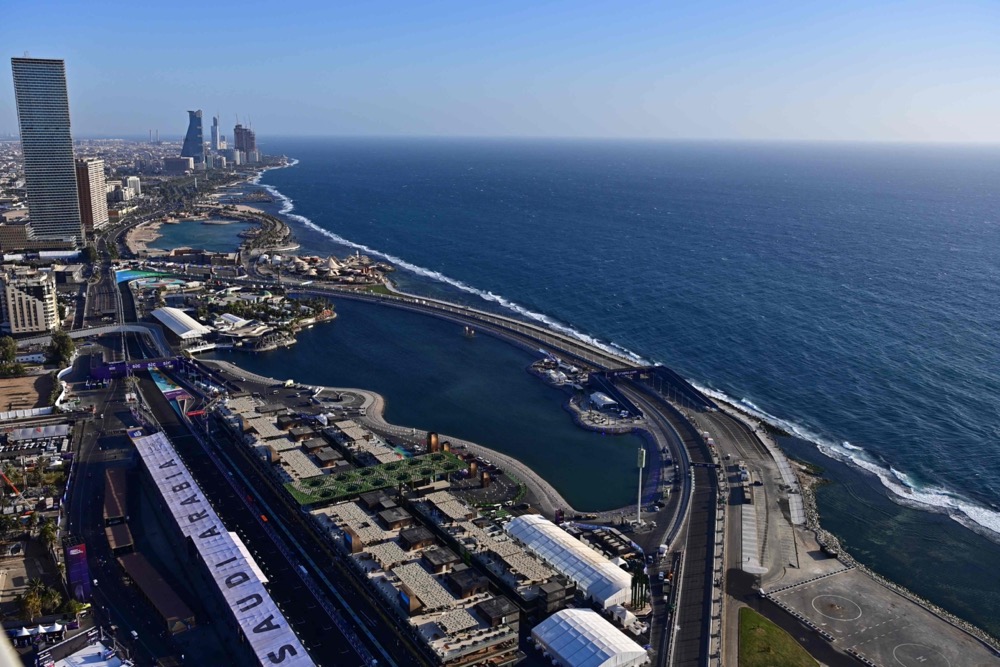
This is the second time Saudi Arabia is hosting the F1 Grand Prix in Jeddah. (AFP)
Talks on the nuclear deal, however, have now paused after Russia wanted an agreement to allow Iran to be exempt from the international sanctions on Moscow. The US said the two issues are unrelated.
A finalized agreement would once again see Iran able to sell its oil freely on international markets, who are hungry for more supply.
The country may have as many as 65 to 80 million oil barrels on stationary tankers, Bloomberg reported, citing data from intelligence solutions provider Kpler.
Saudi Arabia is hosting the F1 Grand Prix this weekend in Jeddah. Race-goers could see a plume of black smoke from the attack in the distance during afternoon practice.
“I smell burning - is it my car?” said world champion Max Verstappen on his team radio, as he appeared one of the first drivers to notice the fumes in the air.
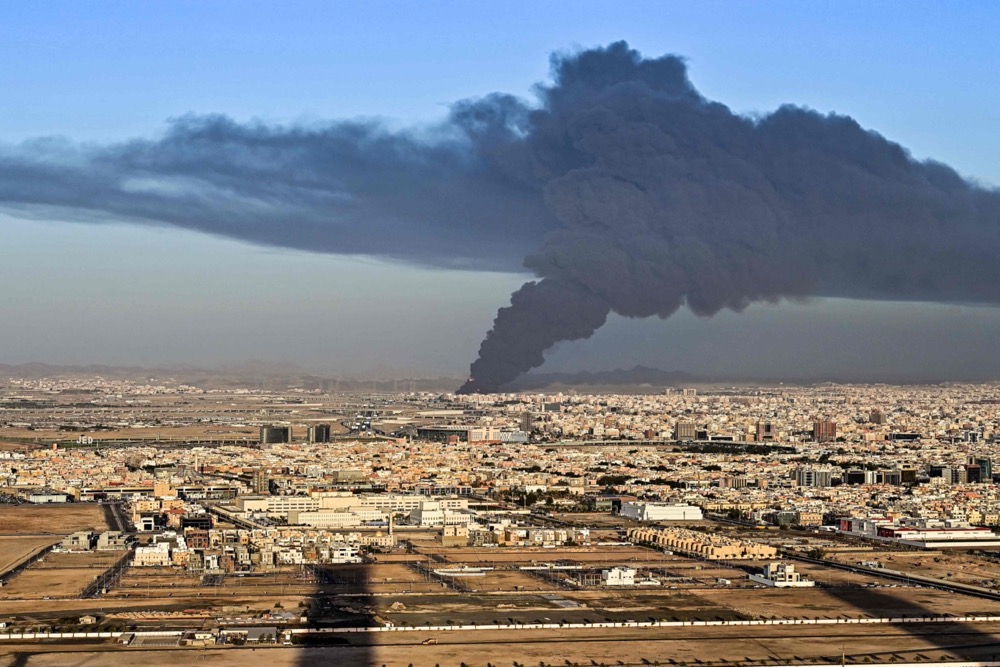
Dark smoke can be seen at the site of the attack on Friday. (AFP)
Despite the drama of the first day, organizers said the race will go ahead as scheduled: “We are aware of the attack on the Aramco distribution station in Jeddah earlier this afternoon and remain in direct contact with the Saudi authorities,” promoter Saudi Motorsport Company said in a statement.
“The race weekend schedule will continue as planned. The safety and security of all our guests continues to be our main priority and we look forward to welcoming fans for a weekend of premium racing and entertainment.”
This is the second time the Kingdom is hosting the event in the Red Sea city. The race on Dec. 5, 2021, was won by Mercedes’ Lewis Hamilton after a dramatic stop-start contest with Dutchman Verstappen, who would later become world champion in the final race of the season, in Abu Dhabi.


